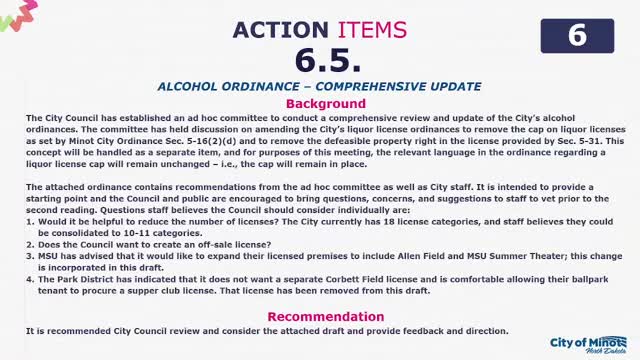Minot council keeps retail liquor-license cap after heated public hearing; directs ordinance rewrite
Get AI-powered insights, summaries, and transcripts
Subscribe
Summary
After more than two hours of discussion and a public hearing with business owners and attorneys, the Minot City Council voted 4–3 to retain the city's existing cap on retail liquor licenses and sent a broader alcohol ordinance rewrite back to staff for revision.
The Minot City Council voted 4–3 on Oct. 20 to retain the city's current cap on retail liquor licenses after a lengthy public hearing that drew more than a dozen business owners and attorneys. Council members also directed staff to continue rewriting Chapter 5 of the city code governing alcoholic beverages and to return with a revised draft for further council review.
The vote came after more than an hour of public testimony from licensed retail operators and attorneys representing groups of license holders. Deb Hoffarth of Pringle & Herrickstead, representing the Magic City Retail Beverage Dealers, urged the council to keep the cap, arguing that purchased licenses are valuable assets and that removing the cap would destroy those investments and reduce city revenue. Jessica Klein of Olsen & Burns, representing Marketplace Liquors, told the council the proposed changes created uncertainty for off-sale retailers because it was not clear how a new off-sale license would interact with existing retail licenses.
Mayor Janser and three aldermen voted to keep the cap. The final tally was: four in favor to retain the cap and three opposed. The council record shows dissenting votes from Alderman Blessum, Alderman Hayes and Alderman Pittner.
The council also unanimously directed staff to continue work on a comprehensive rewrite of the alcohol ordinance (Chapter 5) and to return a revised draft. That rewrite already proposes substantial structural changes, and council members and the city attorney said the draft will be refined further before any ordinance readings are held.
Why it matters: Several license-holding business owners told the council that retail liquor licenses in Minot have been purchased or financed at high market value; they said removing the cap would suddenly devalue those investments. City staff and the city attorney said the rewrite aims to modernize and simplify the ordinance, but acknowledged several open questions remain, including how to treat off-sale-only vendors, how to define supper-club requirements, and how to set or move fees.
Council discussion and next steps: Council members split on policy and principle. Alderman Lehi them (opposed to removing the cap) framed the issue as protecting long-standing local investments and said the city should not remove what current license holders paid for; Alderman Blessum (also opposed) said the city created a regulatory problem and that if the rule base changes the city should consider ways to ease the transition for existing holders. Alderman Pittner and Alderman Hayes opposed keeping the cap; they argued for alternatives that would preserve some value for legacy holders while allowing new entrants under a fee structure.
The city attorney said the draft before council is a proposed repealer/replacer of Chapter 5 and that staff will bring a revised ordinance back; the next iteration will be expected to include consolidated license categories (the council already directed staff to consolidate some retail/specialty categories) and may include a new off-sale license type if the council wants that option.
Public testimony highlights: Business owners and representatives emphasized three consistent points: - Licenses are treated as valuable assets by banks and owners; abrupt rule changes can wipe out those investments. - Compensating legacy license holders if the cap is removed was proposed by some speakers but would require city funding or an alternative mechanism. - Comparable cities vary widely: speakers cited Grand Forks' high retail-class fees, Fargo's high cap values and Bismarck's recent auction minimums as examples.
Ending note: The council's vote preserves the status quo on license count but keeps the policy debate active; staff will return with a revised ordinance and specific proposals to address off-sale licensing, supper-club definitions, fee structure, and other sections of Chapter 5.
